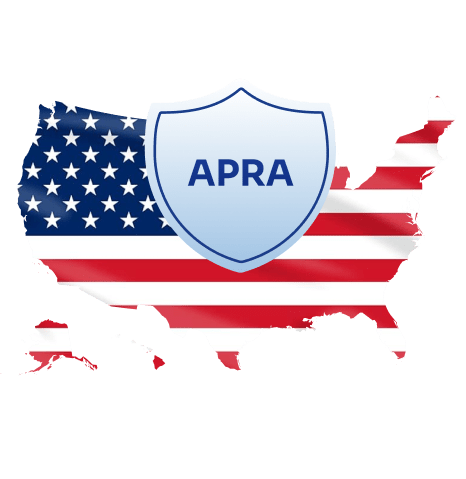Introduction
The American Privacy Rights Act (APRA) establishes a comprehensive federal data privacy law framework for data privacy in the United States, aiming to create a uniform national data privacy law. It defines “covered data” and “sensitive covered data,” tasks the Federal Trade Commission (FTC) with enforcement, and emphasizes data minimization and robust security practices.
The APRA impacts large data holders, mandates affirmative express consent for data transfers, and supersedes state laws like the California Consumer Privacy Act (CCPA) and California Privacy Rights Act (CPRA). It grants a private right of action for consumers, requires data security officers, protects employee data, and regulates data brokers and targeted advertising.
Additionally, it promotes the use of de-identified data and safeguards private communications and human decision-making processes. This act marks a significant step towards comprehensive federal privacy legislation in the U.S. By addressing the gaps left by existing state privacy laws and aligning with global standards like the General Data Protection Regulation (GDPR), the APRA aims to enhance consumer protection across the nation.
Covered data and sensitive covered data
The APRA, or the American Privacy Rights Act, is an important legislation that includes a comprehensive definition of “covered data” and “sensitive covered data.” Covered data broadly includes all non-public personal information about a consumer, such as financial details, contact information, and any other personally identifiable data. On the other hand, sensitive covered data comprises more specific categories of information, including health data, genetic information, precise geolocation information, and information revealing sexual behavior or private communications. The distinction between covered data and sensitive covered data is crucial in understanding the scope and impact of the APRA on data privacy and protection.
Federal Trade Commission’s role
The Federal Trade Commission (FTC) is a key enforcer of the provisions laid out in the APRA. Serving as the primary regulatory agency, the FTC is tasked with the important responsibility of monitoring compliance, conducting thorough investigations into potential violations, and imposing penalties on organizations that do not meet the data privacy standards outlined in the act. This enforcement framework is specifically crafted to guarantee that businesses give the utmost priority to upholding data security and protecting consumer privacy.
Data minimization and security practices
APRA emphasizes the principle of data minimization, which necessitates that organizations restrict the gathering, retention, and handling of personal data to the extent necessary for their activities. The regulation also dictates stringent data security measures, such as adhering to specific data security standards and designating data security officers to ensure adherence and safeguarding of confidential information from unauthorized access.

Impact on large data holders and small businesses
Large organizations that store significant amounts of data, such as major technology companies and data intermediaries, are subject to strict regulations under the APRA. Large organizations that store significant amounts of data, including sensitive data, are subject to strict regulations under the APRA. These entities are required to implement thorough measures to safeguard data privacy and security, regularly assess the impact of their privacy practices, and offer transparent options for individuals to opt-out of data collection. While the regulations also extend to small businesses, they incorporate provisions to ease the compliance requirements for smaller entities, acknowledging the limitations of their resources.
Transferring covered data
The APRA strictly regulates the transfer of covered data, particularly sensitive covered data, across borders and to third parties. According to the regulations, organizations are required to obtain explicit consent from consumers before transferring their data. Additionally, they must ensure that the receiving entities comply with equivalent data protection standards. This provision is designed to prevent unauthorized data sharing and to bolster consumer trust in digital transactions.
Comparisons with existing state privacy laws
The American Privacy Rights Act (APRA) introduces a comprehensive federal framework for consumer privacy intended to standardize privacy protections across the U.S. Here are some comparisons with existing state privacy laws:
Scope and preemption:
APRA: Applies nationally, superseding state laws to create a unified standard.
State Laws, such as the California Consumer Privacy Act (CCPA) and Virginia Consumer Data Protection Act (VCDPA), vary widely in scope and requirements, leading to a patchwork of regulations.
Consumer rights:
APRA: Grants rights similar to GDPR, including access, deletion, correction, and portability of personal data.
State Laws: Many states offer similar rights, but there are variations. For example, the CCPA emphasizes the right to opt-out of data sales, while the VCDPA includes rights to correction and data portability.
Enforcement and penalties:
APRA: Enforced by the Federal Trade Commission (FTC) with significant penalties for non-compliance.
State Laws: Enforcement typically lies with state attorneys general. Some states, like California, also allow for private rights of action in cases of data breaches.
Business obligations:
APRA: Requires businesses to implement robust data protection measures, conduct impact assessments, and be transparent about data practices.
State Laws: Similar obligations exist, but specifics can vary. For example, the Colorado Privacy Act (CPA) mandates data protection assessments for high-risk processing activities.
Exemptions and exceptions:
APRA: Includes exemptions for certain data types and entities, such as small businesses.
State Laws: Exemptions also vary by state. For instance, the Utah Consumer Privacy Act (UCPA) has thresholds that exclude smaller businesses from compliance requirements.
Overall, the APRA aims to harmonize privacy protections and reduce the complexity of complying with multiple state laws.
Private right of action and consumer rights
The APRA grants consumers the legal right to take action against companies that violate privacy regulations, which result in significant harm to their privacy. This provision allows individuals to hold organizations accountable in a court of law and seek compensation for any damages suffered. Furthermore, the act specifies a range of consumer rights, including the right to access their personal data, request the deletion of their data, and opt-out of targeted advertising and the sale of their data.

Data security officers and their responsibilities
According to the APRA, it is mandatory for covered entities to designate data security officers. These officers are entrusted with the responsibility of not only implementing but also overseeing data security practices within the organization. Their primary objective is to ensure full compliance with the act’s stringent requirements, conduct regular and thorough security assessments, and take immediate and effective actions in response to any data breaches. The pivotal role played by these officers is critical in upholding the integrity and confidentiality of consumer data, thereby fostering trust and security within the regulatory framework.
Employee data and privacy
The American Privacy Rights Act (APRA) is dedicated to upholding the privacy of employee data by acknowledging the sensitive nature of information related to employment. This act mandates that employers take proper measures to protect employee data, including the implementation of privacy policies and clear guidelines on data processing practices. The scope of protection encompasses data pertaining to educational enrollment, health insurance, and various other employment benefits.
Litigation costs and compliance
Compliance with the American Privacy Rights Act (APRA) requires substantial commitments to data security infrastructure and legal resources. Covered entities are obligated to allocate resources for privacy impact assessments, employee training programs, and technological advancements. Despite the potentially significant expenses involved, the act is designed to minimize overall litigation costs by offering clear directives and diminishing the likelihood of data breaches and the legal issues associated with them.
Data brokers and targeted advertising
The American Privacy Rights Act (APRA) has set forth strict regulations for data brokers who collect and sell consumer data for targeted advertising. These entities are required to obtain explicit consent from consumers before using their data for marketing purposes and must provide transparent opt-out mechanisms. The primary goal of APRA is to safeguard consumers from intrusive marketing practices and to establish clear transparency in the collection and utilization of consumer data.

De-identified data and anonymization
The American Privacy Rights Act (APRA) emphasizes the importance of utilizing de-identified data to mitigate potential privacy risks. De-identified data consists of information that has been modified so that it cannot be directly linked to an individual without the use of additional information. To safeguard individuals’ privacy, organizations are required to employ strong anonymization methods to guarantee that de-identified data is securely protected and cannot be manipulated to re-identify individuals. This provision seeks to strike a balance between facilitating data utilization and safeguarding individual privacy.
Impact on private communications and human decision-making
The American Privacy Rights Act (APRA) is a comprehensive piece of legislation designed to safeguard the privacy of individuals in the digital age. One of its key provisions is to provide specific protections for private communications, such as emails and text messages, ensuring that these forms of communication are not unlawfully intercepted or monitored.
The act protects the privacy of communications and addresses the impact of automated decision-making processes on individuals. It requires transparency and accountability in using algorithms that affect consumer rights and opportunities. This includes ensuring that individuals are informed about the use of algorithms that may impact their access to services or opportunities and providing mechanisms for challenging decisions made by automated processes.
Conclusion
The American Privacy Rights Act (APRA) represents a significant milestone in the development of data privacy laws in the United States. This comprehensive federal privacy framework is designed to safeguard consumer data, promote strong security measures, and establish uniform protection nationwide. Through its emphasis on minimizing data collection, empowering consumer rights, and implementing rigorous regulatory supervision, the APRA establishes a cutting-edge benchmark for data privacy and security in the era of digital technology.




